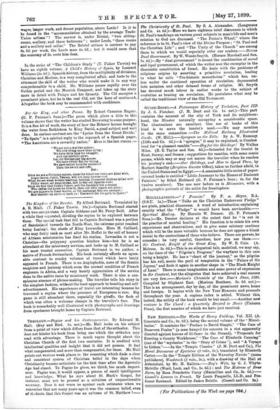MISCELLANEOUS.—" I Promise." By F. D. Meyer, BA. (S.S.U. ls.)—These
"Talks on the Christian Endeavour Pledge" are plain, practical discourses. A word of introduction explaining exactly what the "Pledge" is would have been serviceable.— Spiritual Healing. By Horatio W. Dresser. (G. P. Putnam's Sons.)—Mr. Dresser declares at the outset that he "is not in the practice of mental healing." His function is to relate his own experiences and observations, and to give some salutary cautions which will be the more valuable because he does not oppose a blank denial to the contentions of those who believe. There are powers, he concedes ; be very careful, therefore, how you use them.— Sir Constant, Knight of the Great Xing. By W. E. Cule. (A. Melrose. 3s. 6d.)—This is an allegorical tale, modelled, we may say, on the lines of the "Pilgrim's Progress," the wayfarer in this case being a knight. He has a "chart of the journey," as the pilgrim has his roll, meets the peril of temptation in the "Palace of Sir Joyous," and finds it again in another shape in "The Black Knight of Law." There is some imagination and some power of expression in Sir Constant, but the allegories that have achieved a real success are very few.—Mori-son's Chronicle of the Year's News, 1898. Compiled by Oliphant East. (Morison Brothers. 3s. 6d. net.)— This is an arrangement, day by day, of the prominent news, home and foreign. It begins with the New Year Honours, and proceeds throughout the year. A copious index is added. Without this, indeed, the utility of the book would be but small.—Another new venture is The Chord : a Quarterly Devoted to Music (Unicorn Press), the first number of which we have just received.






































 Previous page
Previous page